 Fighting
Abortion—The Measure of a Just Society by Tony Perkins
Fighting
Abortion—The Measure of a Just Society by Tony Perkins
The abortion debate is far more than a mere political issue. It strikes at the heart of every society. Without the light of God’s Word upholding the sanctity of human life, Western nations lose all respect for the sanctity of the unborn.
Having grown up in a Christian home and having accepted Jesus Christ as my personal Savior at the age of nine, I just assumed that I was pro-life, even though I can’t recall ever hearing a sermon on the topic. After all, I thought, aren’t all good Christians pro-life?
In the summer of 1992, I came face to face with the realization that being pro-life was more than a slogan on a bumper sticker—it was an understanding that what some have relegated to a mere political issue is in fact at the very nexus of a God-honoring, just society.
That July, Operation Rescue—a nonviolent pro-life movement that was all over the news at the time—came to my hometown of Baton Rouge to conduct a “rescue” at one of the city’s two abortion clinics. This amounted to basically just sitting and praying—and sometimes singing hymns—in front of the clinic. The purpose was to get pregnant women to pause and rethink their abortion decision. As a veteran officer working with the Baton Rouge Police Department Reserves, I had a front-row seat to the event. And what I experienced would rock my world.
A Question at the Core of Our Nation’s Identity
At roll call one evening, word came of the pending demonstration. I was taken aback by the negative and almost hostile reaction from some of my fellow officers. As the protest drew closer, the city spared no expense in mobilizing a tactical response that rivaled a small military operation.
A public street was blocked off and an 8-foot chain-link fence was erected down the center of the road to keep the praying protestors from accessing the area around the clinic. In my nearly ten years of law enforcement and international antiterrorist work, I had never witnessed such a response to a planned peaceful protest.
Why did the prospect of peaceful protestors elicit such an aggressive and militant response? I wanted to find out, so I purposefully chose not to work during the demonstration. Instead, I went to the clinic each morning that week as an observer to gain greater insight and clarity into this protest and the controversy surrounding it.
Every morning I would arrive at the abortion clinic (along with my personal video camera), and in the evenings my wife and I would attend church services with those who were praying for and publicly standing for an end to abortion.
Should God’s Word or man’s feckless opinion rule in our lives and laws? Clearly, evil will rule if God’s people remain silent.
The experience was a pivotal moment in my life. The overly aggressive and—in a handful of cases—violent behavior of some officers against the peaceful protestors (all of which I was capturing on video) underscored for me that this was no mere “political” issue. It went to the core of who we are as a people.
Persuaded that others needed to witness the real situation, I gave my video footage to a local TV station, which then aired the shocking clips each night. I also wrote about what I saw in a local publication.
This venture into eyewitness reporting didn’t sit well with department officials, and as a result, I was suspended from the force. What I witnessed that week was one of those rare occasions when we are given the opportunity to see beyond the skirmishes to the real battle that is raging for the hearts and minds of people.
Should God’s Word or man’s feckless opinion rule in our lives and laws? Clearly, evil will rule if God’s people remain silent.
Scientific Discoveries About Early Life
We should begin by asking the question, “When does life begin?”
Scientific advances enable us to know the moment an egg is fertilized, when the embryo attaches to the lining of the uterus, and when a baby’s heart first beats in its mother’s womb. All the genetic information you and I possess existed at the moment of conception.
All we will become is present from the first instant that the mother’s egg is fertilized by the father’s sperm. This includes personality, body size, color of eyes and hair, basic intellect, etc.
Science indicates that the baby’s brain begins functioning enough to generate measurable brain waves (electroencephalographic [EEG] impulses) at 40 days.1 Additionally, the baby’s facial muscles move, even appearing to form “smiles” as early as 12 weeks.2
Science alone cannot settle the ultimate questions about the sanctity of life.
Leaders on both sides of the political debate acknowledge that science has uncovered many amazing things about human life, but science alone cannot settle the ultimate questions about the sanctity of life.
Scripture Holds the Key to Understanding the Sanctity of Life
Scripture undergirds the scientific data. As we look to God’s Word, the ultimate source of truth, we see that God, the Creator of life, tells us when personhood begins. He also makes clear who holds the reins of life and death.
Made in God’s image—From the very beginning of the Bible we learn that God is the author of life. Human beings have incredible dignity because we are made in God’s image. “Let Us make man in Our image, according to Our likeness,” the Creator says. “Let them have dominion over the fish of the sea, over the birds of the air, and over the cattle, over all the earth and over every creeping thing that creeps on the earth” (Genesis 1:26).
In giving man dominion over animals God revealed that humanity is in a totally different class from animals. Genesis reveals that God creates human beings with a soul, moral choice, and self-conscious intelligence. We read of God breathing a soul (possessing free will and reason) into a human being in Genesis 2:7 when He “breathed into his nostrils the breath of life; and man became a living being.”
Formed in the womb—There are over seventy references to “the womb” in the Scriptures. One of these is Jeremiah 1:5: “Before I formed you in the womb I knew you.” Catch the wording of this sentence: God forms us in the womb. He is intimately involved in creating and developing the little ones growing within their mothers.
Life sanctified in the blood—We also know that God equates the presence of blood with life. Genesis 9:4 reads, “But you shall not eat flesh with its life, that is, its blood.” Leviticus 17:11 states, “For the life of the flesh is in the blood, and I have given it to you upon the altar to make atonement for your souls; for it is the blood that makes atonement for the soul.” Deuteronomy 12:23 says, “Only be sure that you do not eat the blood, for the blood is the life.”
Scientists have observed that at 22 days of development, a baby’s heart begins beating and pumping the baby’s own blood through his or her circulatory system.3
A conscious soul—Around the end of the first month, a baby’s arms begin developing, and then fingers develop during the second month.4 This kind of development reflects God’s handiwork in the womb:
“You formed my inward parts; you covered me in my mother’s womb. I will praise You, for I am fearfully and wonderfully made; marvelous are Your works, and that my soul knows very well. My frame was not hidden from You, when I was made in secret, and skillfully wrought in the lowest parts of the earth” (Psalm 139:13–15).
In the New Testament we read of the unborn baby who would later be called John the Baptist “leaping” within his mother (“For indeed, as soon as the voice of your greeting sounded in my ears, the babe leaped in my womb for joy,” Elizabeth told Mary in Luke 1:44). This verse implies that God gave John special knowledge of his cousin Jesus’ presence while both were still in their mothers’ wombs. In turn, this implies intelligence and the reality of a soul within John, the not-yet-born successor of Elijah.
Interestingly, the baby begins movement at seven weeks, which can be felt by the mother at sixteen weeks.5
A Call to Action
While it isn’t possible to go into all of the Scripture references to life, womb, pregnancies, babies, murder, etc., in this short article, it is clear that God’s Word says much about the inherent dignity of each human person from conception. God’s Word, the witness of science, and clear reason go hand in hand. Simply put, empirical scientific evidence confirms the reality described in Scripture.
As Christians we must refuse to allow the sanctity of human life to be relegated to and decided by the ever-changing winds of “politics.” As I saw in Louisiana years ago, it is an issue of central spiritual importance to every individual believer and to the church as a whole.
The grandeur of our awesome Creator is reflected in the way He has made each of us, regardless of how we are conceived or the environment into which we are born. God chose to create every single individual in His likeness and endows each of us with “glory and honor” (Psalm 8:5). A being so special and precious should, from the time of conception on, be welcomed into the world and protected by our laws.
During that hot summer week, I finally came to understand that our right to life, ordained by the God of the universe, is at the core of a just society. It demands the unflagging leadership of the church, as we strive to uphold life as the Life-giver meant us to, whether in our personal lives or in our homes, churches, cities, and nations.
When Do We Become Human?
Life is a continuum, from the time that the Creator first knew us, through conception, the various stages in the womb, birth, childhood, adulthood, old age, death, and eternity. At what point in that continuum do we become human?
Prominent scientists advocate different points of humanness. Whose opinion is correct? Does science really give us the answer? Ultimately we must turn to God’s Word to find the answer.
Every time the Bible speaks of the unborn it speaks of a person. Jeremiah 1:5 says God knew us before we were formed in our mother’s womb. David said he was conceived with a sin nature (Psalm 51). Surely the only way we can have a sin nature is to be fully human at the time of conception.
Science may give us wonderful insights into the development of a baby, but it cannot answer the question of when we become human. Only God’s Word sheds light on that mystery: we’re fully human at conception.
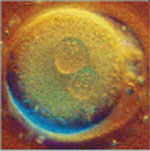
|
At the moment of fertilization, the single-celled baby has all its genetic information. The baby is already a separate person living within the mother’s body. |
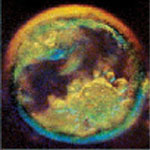 |
Implantation (~ day 6) |
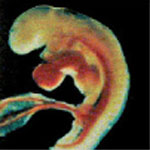 |
Beating heart (week 4) |
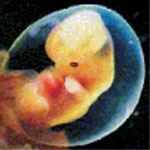 |
Eyes, ears, arms, and legs (week 5) |
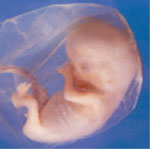 |
The basic structure of all vital organs is established. The baby’s human appearance is unmistakable. (week 8) |
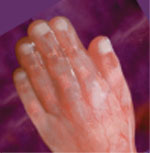 |
The baby’s unique fingerprints are completed (a seven-week process). (week 16) |
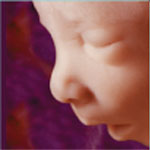 |
The baby clearly feels pain. (week 20) |
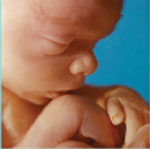 |
Babies born at this stage have a good chance of survival. (week 21) |
 |
At birth, the baby begins to breathe on his own. Yet his mind and body continue to grow and change throughout life. At every point— from conception to death—he is 100% human and precious in God’s sight. |